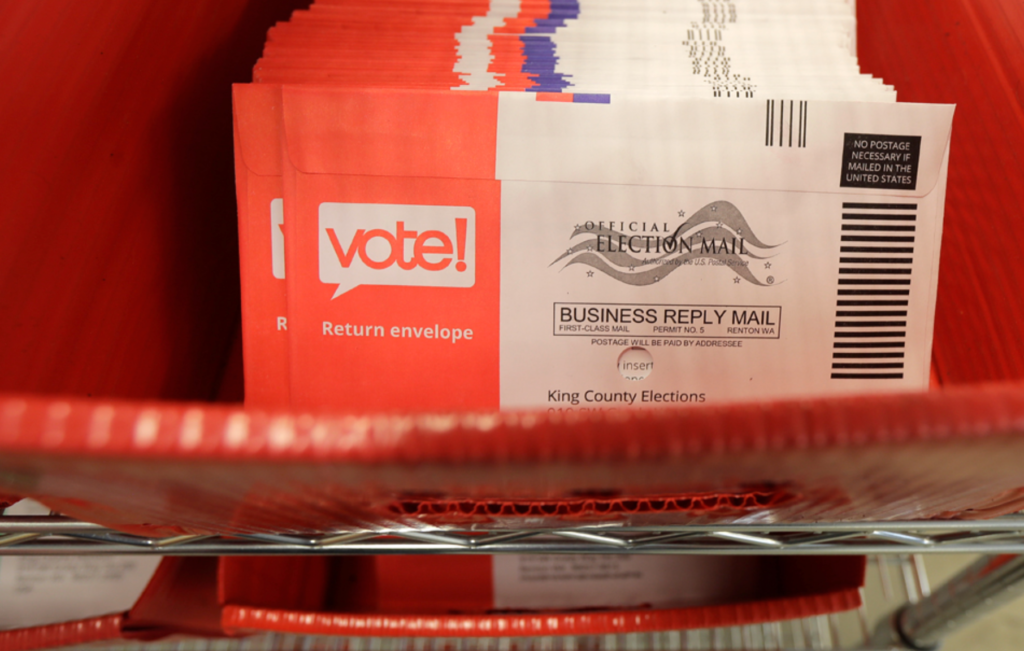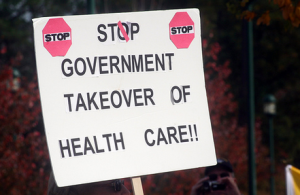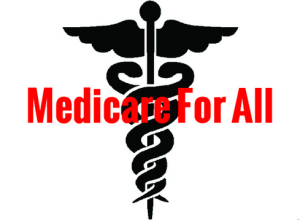It’s not an exaggeration to say our election system is seriously ill. Hurdle after hurdle exist on the path to voting, and millions regularly choose to sit out the chaos. Layered on top of all of that, we now have a lethal pandemic that Dr. Anthony Fauci, director of the National Institute of Allergy and Infectious Diseases (NIAID), predicts will make an encore appearance in the fall, precisely when we’re holding one of the most consequential elections in our history.
All in all, it’s not great a look for the self-proclaimed “greatest democracy on earth.”
But suppose someone told us they had developed a magical elixir for our election problems. I’m talking even better than Trump Water™ and hydroxychloroquine. Something to eliminate the most significant hurdles, such as the significant time and timing issues. Something to end waiting in long lines. Something to allow the “new normal” Stay At Home sensibilities to safely coexist with Election Day.

People with an even passing familiarity with this issue understand that we have that magical elixir right under our noses – vote-by-mail, or vote-at-home. Under such a model, voters are sent their ballots in the mail. They don’t have to go to polling places to obtain them. Then, they can return them in person or via mail.
That’s it. No traveling to polling places. No lines. No work schedule conflicts. No child care barriers. No discriminating election judges. No tight time constraints. No requirement to enter a potentially dangerous COVID hot spot. It’s not a panacea, but it would be a significant improvement.
Yeah But
Untested, you say? We have already been doing vote-by-mail successfully for decades. We’ve offered vote-by-mail to millions of soldiers, absentee voters in all 50 states, many voters in California, and all voters in Oregon, Colorado, Utah, and Hawaii.
Vote-by-mail is old news. It is tried-and-true. In places where vote-by-mail is used, there is no great movement to go back to a polling place-centric model, because vote-by-mail works better.
Expensive, you say? Without the need for expensive polling place staffing, machines, and infrastructure, vote-by-mail saves between $2-$5 per voter, according to research out of Colorado. Cost considerations shouldn’t be the primary reason we implement vote-by-mail, but they also shouldn’t be a reason that we don’t.
Fraudulent, you say? In the wide swath of America that is already voting by mail, there is no evidence of fraud, and bar code and automated record-matching technology continue to make it more secure than ever. The non-partisan Politifact finds that Trump’s frequent claims of fraud are, well, fraudulent.

This lack of widespread fraud shouldn’t surprise anyone. After all, who wants to risk a $25,000 fine, as they have in Oregon, over gaining a single vote, or a few votes, in a pool of millions? As it turns out, almost no one.
Democratic plot, you say? The non-partisan do-gooders at Vote At Home explain this one well:
Utah, the 4th full Vote at Home state, is decidedly “red.” Republicans also dominate Montana and Arizona, where 70% of voters automatically are mailed their ballots as “permanent absentee” voters. Nebraska and North Dakota, also Republican dominated states, have also expanded the use of vote at home options. While Oregon and Washington, the first two states where VAH initially took hold, are today more “blue than red,” both states have elected Secretaries of State who are Republicans – and big fans of this system.
On a more tactical level, the Republican party, whose base is disproportionately elderly, should probably reevaluate this issue in the pandemic era. If I were a Republican turnout strategist, I would worry about depending on their huge block of frightened elderly Americans being willing to bring their over-flowing basket of comorbidities into crowded polling venues during a pandemic.
But you know what? As a Democrat, I want those elderly MAGA-hat wearing seniors to have easy, safe access to voting. I want as many people voting as possible. If my party can’t win a majority of the votes in an election where everyone has an equal opportunity to safely and fairly participate, then my party needs to get it’s ass back to the drawing board to come up with better policy ideas.
Other questions, you say? Read this well-sourced document produced by Vote At Home. Spoiler alert: None of the other excuses hold up to reason or research either.
Don’t Get Your Hopes Up, Yet
The reasons to adopt universal vote-by-mail are patently obvious, and an overwhelming majority of Americans of all political stripes agree. A recent Reuters/Ipsos survey found that nearly three-fourths (72%) of Americans, including about two-thirds (65%) of Republicans, support mail-in ballots to protect voters from respiratory disease.
The experts at the Centers for Disease Control agree:
Encourage voters to use voting methods that minimize direct contact with other people and reduce crowd size at polling stations.
* Encourage mail-in methods of voting if allowed in the jurisdiction.
But as with so many issues with overwhelming majority support – such as expanding access to Medicare, higher taxes for the wealthiest 1% and corporations, background checks for gun purchasers, marijuana prohibition, helping Dreamers become citizens, cutting Social Security and Medicare, higher minimum wage, paid maternity leave, and more – Trump, McConnell and their supporting cast in the U.S. Senate are the barrier. Cue David Byrne: “Same as it ever was.”
None of those things will happen until Trump and the GOP-controlled Senate Majority are removed in the fall. None. In Minnesota, Senate Republicans are similarly promising to block a wise vote-by-mail proposal recently floated by Secretary of State Steve Simon.
So while many people around the world are required to put their lives at risk in armed conflicts to establish or preserve their democracy, millions of Americans in 2020 likewise could be required by Republicans to put their lives at risk in deadly germ-infested schools, churches, community centers, and fire stations to preserve their democracy.
Give me democracy, or give me death? In a vast sea of Trump-McConnell era outrages, forcing Americans into this life-and-death choice on November 3rd may be the most outrageous development of all.

 On the heels of the closing of the second year of open enrollment for Obamacare coverage, expect to hear a lot of “government takeover of health care” ranting from conservatives.
On the heels of the closing of the second year of open enrollment for Obamacare coverage, expect to hear a lot of “government takeover of health care” ranting from conservatives.